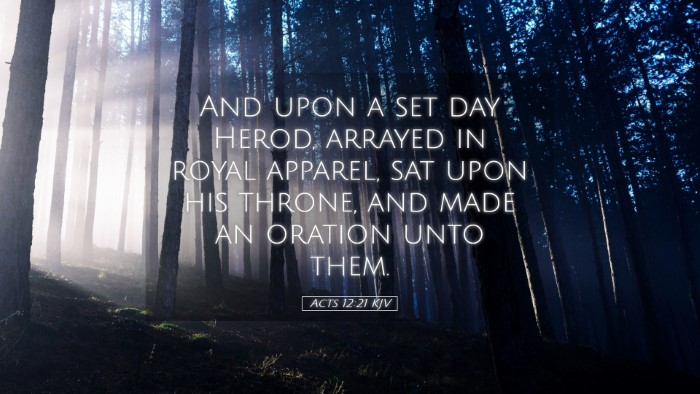Old Testament
Genesis Exodus Leviticus Numbers Deuteronomy Joshua Judges Ruth 1 Samuel 2 Samuel 1 Kings 2 Kings 1 Chronicles 2 Chronicles Ezra Nehemiah Esther Job Psalms Proverbs Ecclesiastes Song of Solomon Isaiah Jeremiah Lamentations Ezekiel Daniel Hosea Joel Amos Obadiah Jonah Micah Nahum Habakkuk Zephaniah Haggai Zechariah MalachiActs 12:21
Acts 12:21 KJV
And upon a set day Herod, arrayed in royal apparel, sat upon his throne, and made an oration unto them.
Acts 12:21 Bible Commentary
Acts 12:21 Commentary
Verse Text: "And upon a set day Herod, arrayed in royal apparel, sat upon his throne, and made an oration unto them."
Contextual Overview
Acts 12 captures a significant moment in the early church, particularly detailing the persecution led by King Herod Agrippa I. This period is characterized by oppression of the Christians, with the execution of James and the imprisonment of Peter. The verse in focus, Acts 12:21, highlights Herod's public address, a pivotal event that reflects the political climate and the attitudes of the people towards leadership and authority. In analyzing this verse, we draw from the insights of prominent public domain commentators.
Matthew Henry's Commentary
Matthew Henry emphasizes the dramatic nature of Herod's appearance and the gravity of the moment. He notes:
- Display of Power: Henry points out that Herod, adorned in fine royal garments, sought to project power and authority. The lavish attire served not only to impress but also to invoke reverence among the people.
- Oratory Skills: His ability to attract the crowd's attention through eloquent speech suggests a strategic use of rhetoric, aligning with political ambitions that seek to sway public opinion.
- Sign of Favor: The people’s reaction to his speech and their subsequent adoration reflect their longing for leadership, indicating Herod's temporary ascendancy as a beloved figure.
Albert Barnes' Commentary
Albert Barnes provides a critical analysis of Herod's stature and the implications of his oration:
- Royal Authority: Barnes notes that Herod's throne symbolizes his ruling authority. Such displays are common among monarchs seeking to affirm their dominance.
- Public Reaction: He draws attention to the crowd's response, showcasing how flattery and charisma can manipulate public emotions, drawing a parallel to modern leaders who rely on similar tactics.
- Divine Judgment: As an underpinning theme, Barnes anticipates the swift divine retribution that follows, serving as a warning to those who oppose God’s people.
Adam Clarke's Commentary
Adam Clarke also adds depth to the understanding of Herod's actions and their ramifications:
- Theatrical Presentation: Clarke highlights that Herod's oration was likely performed in a grand manner befitting his royal status, evoking admiration and allegiance among the listeners.
- Symbolic Importance: He points out that this event marks a significant turning point in the narrative where the struggle between earthly power and divine authority becomes apparent.
- Foreshadowing Consequences: Clarke’s insights lead to an expectation of consequences for Herod’s hubris, connecting the verse to the broader biblical theme of God’s ultimate sovereignty over human pretensions.
Theological Implications
The verse presents a rich ground for theological reflection:
- Human Authority vs. Divine Will: It illustrates the tension between human authority and divine will. Herod’s arrogant display is met with divine oversight, foreshadowing the eventual downfall of leaders who oppose God’s intentions.
- Public Speech and Its Power: The passage invites a discussion on the power of speech, reminding leaders today of the weight their words carry and the influence they wield over the masses.
- Caution Against Pride: The subsequent narrative reminds us of the peril of pride and self-exaltation, serving as an admonishment for those in positions of power.
Application for Today
This commentary on Acts 12:21 serves as a timeless reminder of the nature of leadership, authority, and the caution required of those who wield power. Here are some applications for contemporary pastors, students, theologians, and scholars:
- Leadership Integrity: Leaders are urged to reflect humility, ensuring that their actions and choices align with God’s purposes rather than personal ambition.
- Critical Discernment: The ability to discern rhetoric and public perception in today’s socio-political climate is vital for effective ministry and witness.
- Faith in Divine Justice: Believers are encouraged to trust in God’s justice amid earthly injustices, assured that God is sovereign and will ultimately vindicate His people.


